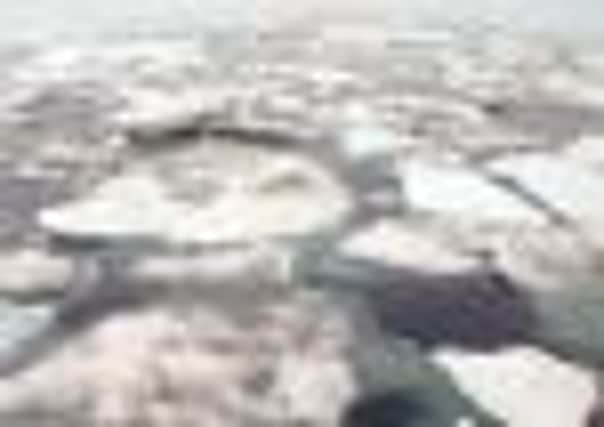Arctic sea ice will vanish within three years, says expert


Figures published yesterday from the National Snow and Ice Data Centre (NSIDC), in the United States, reveal that sea ice in the Arctic has dropped to its lowest level since satellite recording started 30 years ago.
It is the sixth year in a row that a new record low has been recorded, following consecutively worsening melts first identified in 2007.
Advertisement
Hide AdAdvertisement
Hide AdThere is now 40 per cent less sea ice in the polar region than the average levels recorded between 1979 and 2000.
With melting season still not over, concerns are growing that in a few years there will be no summer sea ice at all – spelling disaster for wildlife such as polar bears, which rely on ice to hunt.
Environmentalists, who have long warned that this year would bring a record low, renewed demands for politicians and businesses to do more to cut carbon emissions. Peter Wadhams, professor of ocean physics at Cambridge University, who was branded “alarmist” after he first detected “substantial thinning” of sea ice in 1990, said: “The entire ice cover is now on the point of collapse.
“The extra open water already created by the retreating ice allows bigger waves to be generated by storms, which are sweeping away the surviving ice. It is truly the case that it will be all gone by 2015. The consequences are enormous and represent a huge boost to global warming.”
He said that while reducing carbon emissions was the only solution, geo-engineering techniques – including one proposed by a Scottish professor – should be “urgently” explored.
The proposal by Professor Stephen Salter at Edinburgh University, which was revealed earlier this year, involves building towers that would spray sea water into the sky to help create white clouds.
The theory is that whiter clouds will help reflect the sun’s rays back into space to help keep the Earth cooler.
Dr Richard Dixon, director of WWF Scotland, said Scotland must also do more to achieve its new carbon emission targets, the first of which were recently missed.
Advertisement
Hide AdAdvertisement
Hide AdHe said: “This is not unexpected but it is extremely bad news. These satellite images show what we are doing to the planet and while climate change has gone off the political agenda recently, things have got worse and governments and big business must do more to fix that.”
He added that while many other countries are experiencing temperatures rising as a result of global warming, Scotland was getting colder.
“Polar ice shapes the weather systems in Scotland and the north-west of Europe, and sea ice loss is one reason why we’re getting colder summers and have had very cold winters in the last few years.”
NSIDC stated: “Arctic sea ice fell to 1.58 million square miles on 26 August, 2012. This was 27,000 square miles below the 18 September, 2007, extent of 1.61 million square miles.
“The six lowest ice extents in the satellite record have occurred in the last six years.”